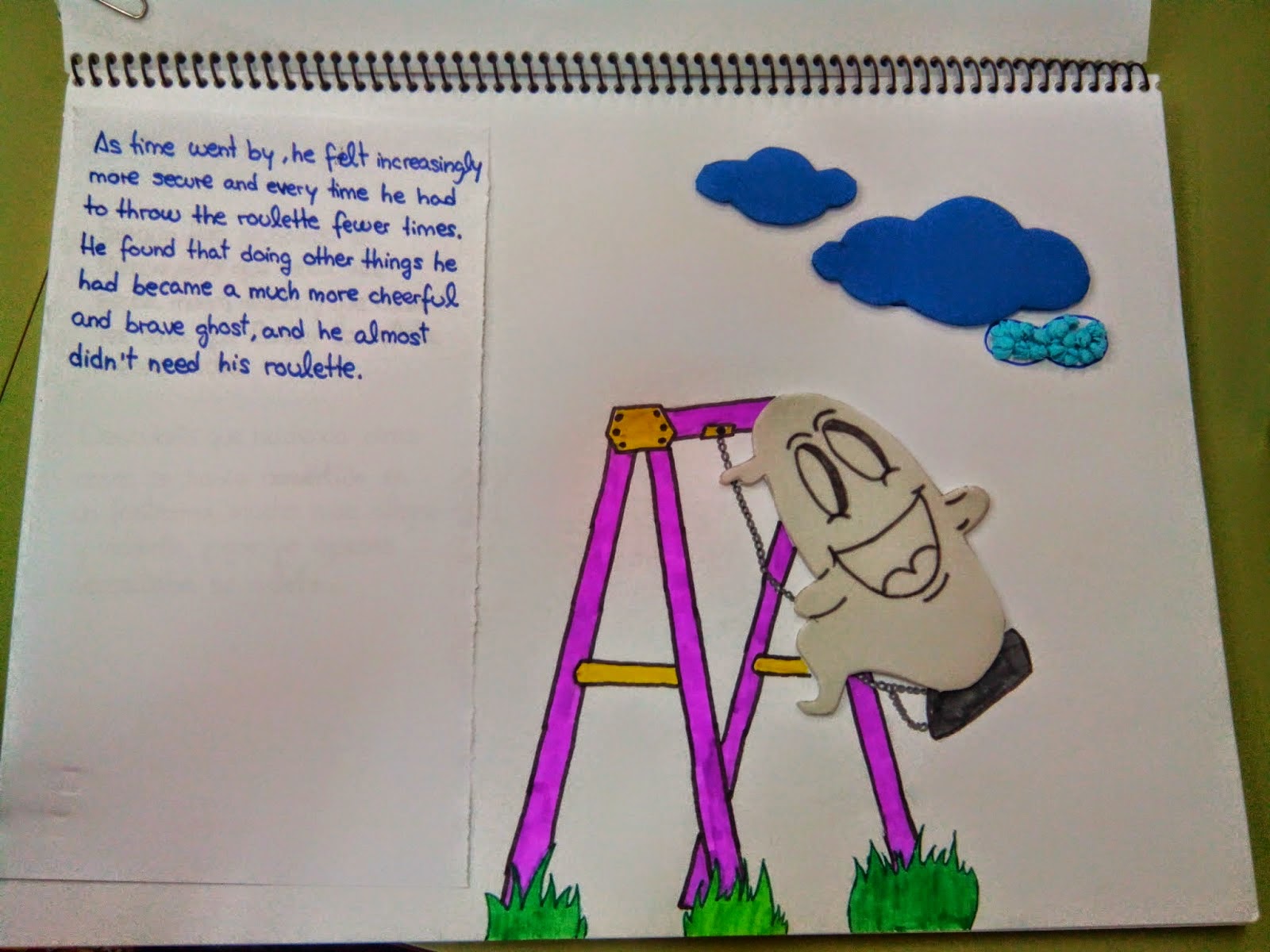CRISPIN, THE CRYING GHOST
1. CONTEXTO:
Esta actividad va dirigida a alumnos de 2-3 años, ya que son capaces de aprender nuevo vocabulario con rapidez y entienden casi todo lo que oyen.
La actividad se incluye dentro de la unidad de trabajo ‘Las emociones’, a la cual dedicaremos una semana. El cuento se leerá el tercer día, después de haber visto la felicidad y la tristeza los días anteriores.
2. OBJETIVOS DE LA ACTIVIDAD:
- Conocer las distintas emociones.
- Aprender que el miedo puede vencerse.
- Iniciarse en el control de estas emociones.
3. TEMPORALIZACIÓN:
La actividad se realizará en la biblioteca de la escuela si se dispone de ella. Si no fuera posible, se realizará en el rincón de lectura del aula de 2-3 años.
La actividad de jugar con la ruleta se realizará, si es posible, en el aula de psicomotricidad, si no se pudiera, se realizaría en la misma aula.
Las actividades se realizarán el miércoles.
4. TEXTO DEL CUENTO:
In the biggest, darkest and most solitary castle that you can imagine, Crispín, the ghost, lived.
His screams and howls were so terrifying that could freeze the blood of a dragon and the soul of the best warrior.
What nobody knew was that Crispín, in his deepest, was just a crying and coward ghost, for 500 years he did nothing but cry and scream.
After so many years of crying and screaming, no monster had appear who wanted to eat him, and he was tired, the holes in his sheet ached of mourning.
He decided to invent a special toy “Fright roulette”, the only thing he had to do was to throw the roulette when he felt fear and this would tell him what to do.
So he would not have to be crying and screaming all day, that toy turned out to be a brilliant invention, because as Crispín was frightened by everything, he spent the night pulling the roulette: dancing, singing, clapping his hand, belching and a lot of other things.
As time went by, he felt increasingly more secure and every time he had to throw the roulette fewer times. He found that doing other things he had become a much more cheerful and brave ghost, and he almost didn’t need his roulette.
After a time, Crispín’s Castle stopped being so terrible, and some people began to visit him. One day, a boy discovered him in his hidden place, and the child was so scared that he began to mourn and scream. What a fright for Crispín!
He was so scared that he had to pull the roulette 100 times. Then he realized that he had discovered the scariest of all things, screams and howls. Gathering all the courage that he had under the sheet, Crispín approached the boy and gave him his “Fright roulette”. The child liked the gift so much that both spent hours and hours playing.
The ghost was so glad to have discovered how to cure fear that from that day he made roulettes for all children who cried and screamed while the worst ghost scared them.
5. METODOLOGÍA:
La actividad comenzará con una pequeña introducción en la que se realizará alguna pregunta sobre los fantasmas.
A continuación se pasará a la lectura del cuento de forma que no resulte monótono y aburrido para los niños.
Después se repasará el vocabulario trabajado en el cuento a través de los dibujos de este.
Para finalizar, realizaremos nuestro juego de la ‘Ruleta del gran susto’, de manera que ellos lancen la ruleta y vayan realizando las diferentes acciones que vayan saliendo.
6. ACTIVIDADES:
- Repasar el vocabulario del cuento a través de las imágenes de éste.
- Jugar con una ruleta como la del cuento para que los niños se diviertan y aprendan/repasen diferentes acciones.
7. VOCABULARIO CONCRETO QUE SE QUIERE ENSEÑAR:
- Ghost: fantasma.
- Roulette: ruleta.
- Cry: llorar.
- Scream: gritar.
- Trunk: baúl.
- Sheet: sábana.
8. VOCABULARIO QUE SE QUIERE REPASAR:
- Bed: cama.
- Castle: castillo.
- Monster: mosntruo.
- Dance: bailar.
- Sing: cantar.
- Play: jugar.
- Cat: gato.
9. MATERIALES NECESARIOS:
- Cuento.
- Ruleta para jugar.
10. FUENTE:
Este cuento es una adaptación de una historia extraída de la página webwww.cuentosparadomir.com
11. VARIACIONES:
En principio no tendría que realizarse ningún tipo de variación respecto a esta actividad. En todo caso, el cambio más probable sería cambiar el día de la semana en que se trabaje la emoción del miedo.








No hay comentarios:
Publicar un comentario